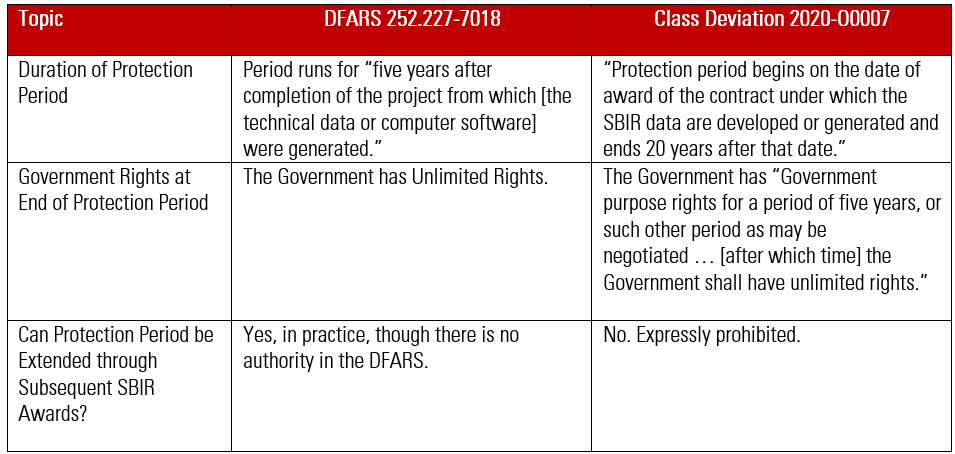Key Changes from the Deviation
The Deviation requires DoD contracting officers to substitute the deviation’s language for the regulatorily prescribed SBIR Data Rights Clause, DFARS 252.227-7018. Among other things, this deviation (1) imposes a finite protection period of 20 years for SBIR data (during which the Government has only SBIR data rights); (2) eliminates the possibility of extensions of SBIR Data Rights through follow-on awards; and (3) provides the Government with only Government Purpose Rights instead of Unlimited Rights after expiration of the protection period. The following chart addresses these key changes:

The new 20-year protection period may be viewed by contactors as a mixed blessing. Contractors will likely welcome the certainty that comes with the new 20-year term, which is much longer than the five-year period that has been prescribed by the DFARS. But contractors are losing the ability to establish successive five-year protection periods through subsequent SBIR awards, which in some cases has enabled contractors to extend the period of protection even beyond 20 years.
Impetus for the Deviation and Anticipated Future Contract Clause Revisions
The Deviation seeks to implement the Small Business Administration’s revised SBIR/STTR Policy Directive, which became effective on May 2, 2019. Despite the policy’s stated effective date, its effect on SBIR contracts has been limited because agencies must publish new contract language to implement many of the directive’s policies. The Deviation does this, on an interim basis, for the DoD.
The governing statutes grant the Small Business Administration authority to direct agencies’ actions regarding SBIR contracts, and agencies cannot promulgate policies or regulations that are inconsistent with the SBA’s SBIR/STTR Policy Directive. Accordingly, both the DoD and civilian agencies are working to issue new DFARS and FAR clauses to implement the SBA’s updated directive. The DoD is reviewing internally a draft DFARS rule. (See Defense Acquisition Regulations Council 2019-D043.) Meanwhile, the Federal Acquisition Regulatory Council is in the process of drafting a proposed rule and anticipates that an internal report on this rule will be completed later this month. (See FAR Case 2020-010.)
Conclusion
We anticipate additional policy changes affecting SBIR contracts in the near future. Some of these changes likely will affect eligibility for SBIR awards. Stay tuned for further developments.
